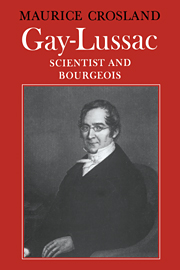Book contents
- Frontmatter
- Contents
- Preface
- Chronological table
- List of abbreviations
- 1 A young provincial in Paris
- 2 The apprentice of Arcueil
- 3 Personal influences and the search for laws
- 4 Collaboration and rivalry
- 5 The volumetric approach
- 6 Scientific research
- 7 Professor, Academician and editor
- 8 A scientist in the service of government and industry
- 9 A new technique and the dissemination of technical information
- 10 Scientist and bourgeois in the political arena
- 11 The legacy
- Appendix: select correspondence
- Notes
- Select bibliography
- Name index
- Subject index
8 - A scientist in the service of government and industry
Published online by Cambridge University Press: 03 November 2009
- Frontmatter
- Contents
- Preface
- Chronological table
- List of abbreviations
- 1 A young provincial in Paris
- 2 The apprentice of Arcueil
- 3 Personal influences and the search for laws
- 4 Collaboration and rivalry
- 5 The volumetric approach
- 6 Scientific research
- 7 Professor, Academician and editor
- 8 A scientist in the service of government and industry
- 9 A new technique and the dissemination of technical information
- 10 Scientist and bourgeois in the political arena
- 11 The legacy
- Appendix: select correspondence
- Notes
- Select bibliography
- Name index
- Subject index
Summary
‘The British understand material interests much better than we do and this is the secret of their great prosperity. We, Gentlemen, are always concerned with abstractions. Of course I do not deny the realm of ideas but I insist that applications should not be too much despised’
Gay-LussacDuring the Revolutionary and Napoleonic wars science had been applied by the French in many ways: in munitions, communications and the search for alternative raw materials. In the period of the Restoration the basic utility of science was something which was generally accepted but the problem was to catch up with the Industrial Revolution in Britain which was giving Britain a leading position in world markets. Although in chemical industries France was probably at least the equal of her neighbour, in most other areas France looked to Britain as the leading industrial nation. The contrast was nowhere more marked than the development and use of the steam engine. In the conditions of peace a new stimulus was given to industrial development. The industrial exhibitions begun in the Revolutionary and Napoleonic period continued on a larger scale and Gay-Lussac, who had already been a junior member of the panel of judges for the 1806 exhibition, was asked to take part in the judging for the 1823 and 1827 exhibitions. The Conservatoire des Arts et Métiers was expanded in the Restoration period and in 1819 a governing body (Conseil de Perfectionnement) was set up with Gay-Lussac as one of its members.
- Type
- Chapter
- Information
- Gay-LussacScientist and Bourgeois, pp. 178 - 204Publisher: Cambridge University PressPrint publication year: 1978



